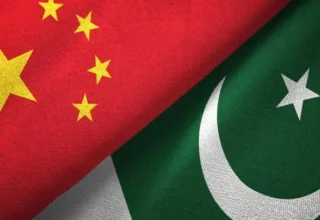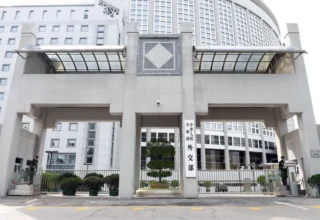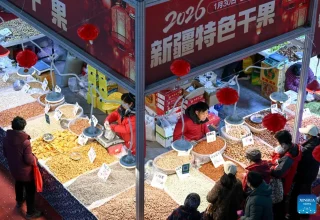
Despite all odds the Chinese socialist economy is thriving whereas capitalism is sinking and facing lots of chronic problems of production and global supply chains. Even in the wake of ongoing Trump trade & tariffs war the Chinese economy remained stable, sustainable, diversified and developed showing its immense structural resilience and global outreach. Hence false, fake and fabricated notion of overcapacity has become its ultimate refuge.
US and the Western overcapacity have become a new card to label Chinese industries. These forces have been targeting the Chinese economy, its industries and of course BRI as a response to China’s industrial overcapacity.
Additionally, overcapacity has become the latest “ideological” weapon in Trump’s trade & tariffs war against China. It seems that the Western greedy politicians and neoliberal economists use to blame so-called China’s industrial subsidies and production capacity for the US’s trade deficit and its apparent inability to re-industrialize its national economy.
Moreover, there the Western politicians, academics, and mainstream media have been purposefully involved to propagate the narrative of Chinese overcapacity. It appears to be a “synchronized” scheme of arrangements by the West to scapegoat China for structural problems and imbalances in the world capitalist economy. Thus the geopolitics of capitalism is deepened.
Comparative economic studies of the US and EU reveal a sustained trade deficit since decades ago, before China’s emergence as an industrial superpower. Ironically, before China it was Japan and Germany that were the source of the US’s protracted trade deficits suggesting that the main problem remained the decline in the competitiveness and productive capabilities of the US itself rather than China’s industrial policies.
Evidently, the Chinese policy makers are further transforming its socialist market economy through rapid innovation, modernization, digitalization, AI, qualitative industrialization and last but not least openness and transparency.
Therefore, drastic reduction in solar PV and wind energy costs of around 90 percent over the last decade is because of massive qualitative industrialization and investments which has nothing to do with overcapacity.
Shockingly, the Western elite class and capitalist economy do not criticize its own faulty neoliberal policies and always incriminate China for the destruction of its industrial base allowing the same ruling class to resort to protectionism and subsidies on behalf of monopoly capitalists.
Conversely, China is developing meaningful modern technologies that are vital for the future of mankind. Meanwhile, the ruling elite in the West gamble away wealth produced by workers through stock buybacks and real estate speculation. Thus the Western policy makers should not organize their workers against China and the Global South and instead fight to liberate their own productive forces necessary to address the socioeconomic and ecological challenges of this century.
Definitely, there is no such thing as overcapacity in China, whether from the perspective of comparative advantage or global market demand. Chinese manufacturing and productive channels are widely popular in the global market, relying only on a comprehensive and continuously upgraded industrial system, as well as massive investment in research and development, innovation and HRM.
Thus obviously the Chinese complete manufacturing supply chain ensures the stability of global production, driving technological advancement and industrial upgrading worldwide.
The repeated claims by some Western countries are essentially an attempt to suppress and hinder China’s robust development, representing a form of protectionism that seriously undermines global industrial cooperation and supply chain stability. Moreover, China’s constant upholding of open cooperation and mutual benefit is the correct direction for global economic development.
Hence, China’s industrial subsidy policies are not creating unfair competitive advantages, leading to global overcapacity, particularly in certain sectors like electric vehicles. This concern is derived from the perception that these subsidies distort the market by enabling Chinese companies to produce goods at artificially low prices, undercutting competitors in other countries. It is completely untrue and irrelevant.
It bodes well that the Chinese policy makers always maintain that their industrial policies are aimed at promoting economic growth and technological advancement, and that its subsidies are comparable to those offered by other countries. China also argues that its investments in emerging technologies are essential for global progress.
It seems that the misconception of overcapacity is contrary to economic principles and common sense. The higher volume of exports is not overcapacity.
In the era of economic globalization and international cooperation, comparative advantages align with the principles of market economy and in the context of global labor division and market dynamics which should not be equated with overcapacity.
In summary, the U.S. has repeatedly blamed China’s overcapacity for its export of high-quality, low-cost products, and now new energy products. However, this logic is unsustainable considering the U.S.’s significant export of products like chips and agricultural goods.
These accusations of Chinese overcapacity are invalid. The WTO addresses non-competitive practices with mechanisms like anti-dumping and countervailing duties, but there is a lack of strong evidence that any of those apply to China. Thus the international market success of China’s emerging industries is the result of innovation and efficient cost control by Chinese firms, not excess capacity.
Interestingly, the U.S. Inflation Reduction Act represents a substantial investment in clean energy and provides significant subsidies to the semiconductor sector. Hence its rhetoric of so-called Chinese overcapacity is meant for curbing and suppressing China’s industrial development and is purely economic coercion and bullying.
The writer is of the view that “America First”, economic protectionism, trade & tariffs war and unilateral sanctions on China will achieve nothing but will further decrease the US industrial capacity. It will also badly damage the stability of the global industrial and supply chains and curb the growth of emerging sectors.
The writer suggests that the US policy makers should immediately stop its impulsive mindset and promote a fair competition by implementing international economic and trade rules to truly create a world-class, market-oriented and law-based environment for trade and economic cooperation.
Hence, overcapacity has become a new weapon of capitalism which is anti-development, economic globalization and international cooperation whereas the Chinese socialist economic model is meant for constructive competition, international cooperation with promoting pro-people, business, investment and environment around the globe which has nothing to do with so-called overcapacity.










































